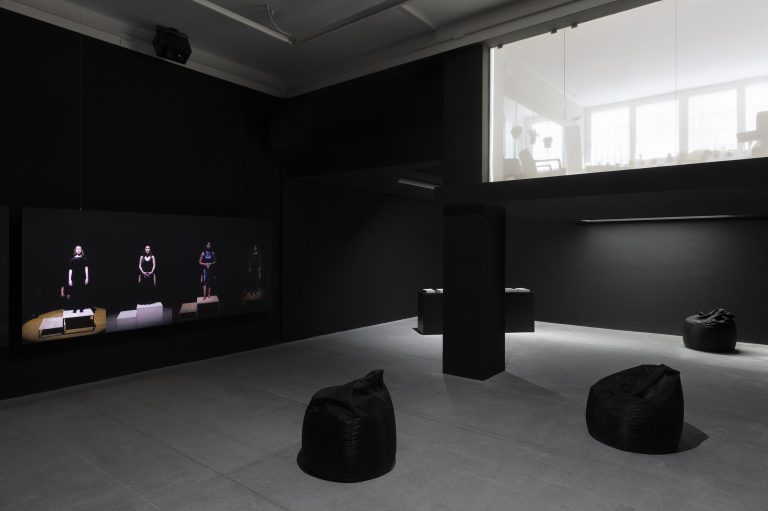Gabrielle Goliath “Elegy” at Galleria Raffaella Cortese, Milan
For her inaugural exhibition “Elegy,” Gabrielle Goliath unveils a lyrical work of remembrance, restore and black feminist love.
Initiated by the artist in 2015, Elegy is a long-term commemorative efficiency, staged in places from Johannesburg to São Paulo, Paris, Basel, Munich and Amsterdam. Every efficiency gathers a gaggle of seven feminine vocal performers who collectively enact a ritual of mourning, sustaining a single haunting tone over the course of an hour. Invoked within the ritual gesture of every efficiency is the absent presence of a named (and beloved) lady or LGBTIQ+ particular person raped and killed in South Africa. For these immersed in its sonic wake, Elegy is a chance not solely to grapple with a normative disaster of patriarchal violence, however to reaffirm the fullness, magnificence and insistence of black, brown, femme and queer lives.
For the exhibition, Elegy, a bespoke set up construction was conceived, weaving a nuanced rating of movies, sound, texts and images via the three gallery areas in By way of Stradella. As the primary displaying of all ten filmed performances of Elegy, the exhibition marks a seminal second in Goliath’s inventive journey:
“That is to me a deeply gratifying recollection and celebration of Elegy, as a piece that is still central to my apply and as pressing as ever in its political demand.”
In an financial system of differentially valued life, Elegy asserts circumstances of hope and avowal, memorialising (as loveable and grievable) the lives of people misplaced to the bodily, ontological and structural violence of rape tradition and femicide in South Africa. Transnational in its attain, it requires solidarity and relation with out collapsing distinction. And, in fact, coming to the work right here in Milan, we discover ourselves implicated, for as Françoise Vergès makes clear in A Decolonial Feminism (2020), this violence just isn’t restricted to the “abject” corners of Africa and the worldwide south, however permeates the racial, gendered and sexualised hierarchies of Europe, and the fashionable/colonial world order it instituted.
Goliath’s inventive gesture is considered one of care and transformation, eschewing spectacle and the common objectification of traumatized black, brown, femme and queer our bodies. Turning to ritual, sound and a praxis of relationality, she provides an area for transformative empathic encounters through which grief collapses illustration and loss presents an alternate web site for neighborhood and creativeness. Within the paralinguistic circulate of this sonic lament, she abandons melody, narrative and codified legibility, drawing members right into a extra visceral, resonant aesthetic expertise. And within the liminal area of this irresolution (reasonably than closure or catharsis), she asks us to collectively carry out a political work of mourning.
Known as to thoughts on this radical sociality is French thinker Emmanuel Lévinas’ conception of the opposite as a boundary perpetually questioning us, of otherness as a elementary situation of our being. This obligation and alternative of “the opposite” is traceable all through the filaments of Goliath’s set up—enjoying out within the contingent, moral phrases of distinction and bearing. Reverberating in our areas, hers is an intimate, pressing and enabling elegy, sounding forth the novel chance of a world in any other case.
The expression launched into the world by the face of the opposite doesn’t problem the weak point of my energy, however my energy of energy
—E. Lévinas 1
at Galleria Raffaella Cortese, Milan
till June 30, 2024
Source link








Michael tuttle says: